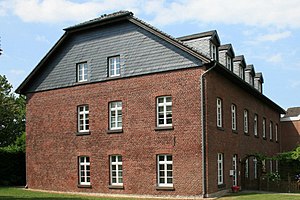Compes mill
| Compes mill
|
||
|---|---|---|
|
The Compesmühle as today's residential building |
||
| Location and history | ||
|
|
||
| Coordinates | 51 ° 12 '4 " N , 6 ° 28' 42" E | |
| Location |
|
|
| Waters | Gladbach | |
| Built | First mentioned in 1559 | |
| Shut down | 1890 demolished | |
| Status | used as a residential building since 1990 | |
| technology | ||
| use | Flour mill and oil mill | |
| Grinder | 1 grind 1 oil press | |
| drive | 1 water wheel | |
| water wheel | undershot | |
The Compesmühle was a water mill with an undershot water wheel on the Gladbach in the city of Mönchengladbach .
geography
The Compesmühle was located on the left side of the Gladbach, on Compesmühlenweg in the Lürrip district . Above the Gierthmühle was located, below was the Engelsmühle . The area on which the mill building stood is around 46 m above sea level. NN .
Waters
The Gladbach, (GEWKZ 28614), which is also the namesake of the city of Mönchengladbach, has been an important lifeline for centuries. It supplied the residents and a total of eight mills with water and was the origin of the flourishing textile industry in Mönchengladbach. The approximately 6.3 km long Gladbach rises in Waldhausen , crossed the districts of Pesch and Lürrip and flowed into the Niers at Uedding . Today it is mostly piped and flows from Volksbadstraße at 1,904 m as an open channel along the Mönchengladbach – Düsseldorf railway line to the Niers. The catchment area of the body of water is 26.208 square kilometers. The care and maintenance of the water is incumbent on NEW AG .
history
Like the Gierthmühle, the Compesmühle always remained independent and did not come into the possession of the convent . The mill was owned by the family and had the same name for centuries. The first owner from 1559 was Henrich tho Kompis and his wife Catharina. In 1786 Heinrich Compes applied for the construction of an oil mill on the right bank of the Gladbach. The abbot approved the construction of the previous flour mill . Over the years a brewery and an inn were also operated in the mill buildings . The river bed of the Gladbach was straightened in 1824 in order to increase the driving force on the water wheels . The mill was closed in 1890 for reasons of profitability and increasing competition . In 1902 the city bought the storage right . After the building was restored in 1990, it is now used as a residential building.
gallery
The Compesmühle on the Tranchot map 1803–1820
Monument protection
The Compesmühle was entered on December 4, 1984 under the monument number C 001 in the monuments list of the city of Mönchengladbach with the following text:
Urban development location in an area that was formerly used for agriculture, which has now been incorporated by modern development. Mill building of the former watermill. Built in 1851, renewed on the old site.
Today there are still two structures of the former farm buildings, of which the two-storey main building in solid brick construction with a gable roof and a crooked hip roof. As well as a half-timbered system mixed with brick, one-story stables and an apartment, already existing before 1851, which expand in an L-shape into a barn with a gate passage.
The protected status includes: the residential and gate buildings of the former medieval watermill no.123 and the brick mill building no.121 and 125.
literature
- Hans Vogt: Lower Rhine water mill guide , 2nd edition. Niederrhein Association, Krefeld 1998, ISBN 3-00-002906-0 , pp. 502-503.
- Robert Lünendonk: On the trail of the Gladbach and its mills . 2008, ISBN 3-8375-0030-6 , 1st edition, pp. 67-69.
- Robert Lünendonk: The Niers and their mills . 2012, ISBN 978-3-8375-0741-6 , pp. 66-70.
Web links
Individual evidence
- ^ German basic map 1: 5000
- ↑ http://www.lanuv.nrw.de/fileadmin/lanuv/wasser/pdf/Gewaesserverzeichnis%20GSK3C.xls









